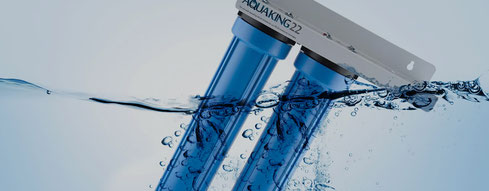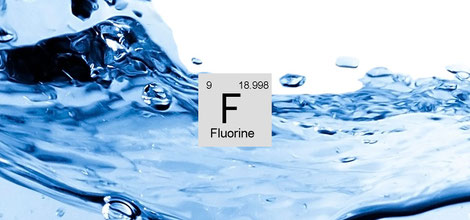Despite government assurances that Singapore tap water is perfectly safe, many Singaporeans choose to install water filters at home, at the office and drink bottled mineral water. Is it really necessary to buy bottled water? Should we be installing filters? And if so, how does one shift through the marketing hype to select the best ones? We pull the lid off of this complicated topic and give you our ultimate guide starting off with Part 1: Fluoride.
Do we really need water filters?

OK first, let's look at the indisputable facts. Singapore's tap water contains small amounts of chlorine, pesticides, lead and other heavy metals, nitrates, nitrites, fluoride and possibly other people’s medical drugs. Why? The chlorine and fluoride are added to kill bacteria and allegedly strengthen our teeth. The pesticides, lead, heavy metals, nitrates and nitrates all end up in our water supply from run-off due to us living in a modern, industrialised and increasingly toxic environment. When people take medical drugs, some of it is absorbed and some excreted by urine and faeces and end up back in the water supply as these particles are so small they cannot be filtered out buy conventional filters.
However, all these compounds are “within the Guidelines for Drinking-Water Quality set by the World Health Organization (WHO)” as stated by Public Utilities Board (PUB) of Singapore. Not surprisingly, other developed countries around the world also follow these same practices. Essentially, what this means is that WHO reviews a load of clinical studies in animals and observational studies in humans to work out what the safe levels are. They then, make recommendations about what these maximum levels should be so that the drinking water can be declared “safe”. Let’s take a look at fluoride first and see how the WHO comes up with its' guidelines.
Part 1: Fluoride
We’re going to really take a deep dive into fluoride here and give this more attention than the other toxins found in our water supply. This is really just to highlight that here, at Levitise, we really take this stuff seriously. We look at both sides of the coin, and don’t just rehash other people’s arguments to support a dogmatic view. OK, let’s get stuck in.
Fluoride and animals studies

I pulled this paper off of the WHO’s website1 where they have the following results highlighted from some scientific studies:
STUDY ONE: “Effects on the skeleton, such as inhibition of bone mineralization and formation, delayed fracture healing and reductions in bone volume and collagen synthesis, have been observed in a variety of studies in which rats received fluoride orally for periods of 3–5 weeks at doses in excess of 16 mg/litre.”
STUDY TWO: “In subchronic studies, altered bone remodelling, hepatic megalocytosis (EDITOR: liver toxicity), nephrosis (EDITOR: kidney disease), mineralization of the myocardium (EDITOR: heart disease) and necrosis or degeneration of the seminiferous tubules in the testis (EDITOR: fertility) were observed in mice administered fluoride in drinking-water (>4.5 mg/kg of body weight per day) over a period of 6 months.”
STUDY THREE: “In mammalian cells in vitro, fluoride causes genetic damage through chromosomal aberrations at cytotoxic concentrations only (≥10 mg/litre)”
STUDY FOUR: “There was a statistically significant trend of an increased incidence of osteosarcomas (bone cancer) in male rats with increasing exposure to fluoride”.
So that's a green tick for the WHO who are not averse to highlighting some of the detrimental affects of fluoride in animal studies.
Fluoride and human studies

So, these are some of the clinical scientific studies from the WHO’s website around animals. The studies in humans are observational and show that:
- Fluoride can have an adverse effect on tooth enamel and may give rise to mild dental fluorosis at drinking-water concentrations between 0.9 and 1.2 mg/litre (Dean, 1942).
- Elevated fluoride intake can also have more serious effects on skeletal tissues.
- Persons suffering from certain forms of renal impairment have a lower margin of safety for the effects of fluoride than the average person.
The WHO, in 2002, did conclude that there is not enough evidence of carcinogenicity in laboratory animals to support the hypothesis that fluoride causes cancer in humans OR that there is any association between babies born with Down Syndrome or congenital malformation to pregnant mothers. However, we looked at several studies that the WHO did not cover and presumably chose to ignore. These studies held some startling facts such as:
| Arthritis | “After examining over 7,000 individuals from six regions, the authors found that the rate of osteoarthritis was significantly increased at water fluoride levels of just 1.7 ppm” (Ge 2006) |
| Brain | There have been 53 human studies linking moderately high fluoride exposures with reduced intelligence2 |
| Cancer | “A national case control study published in 2006 by Harvard scientists found that boys exposed to fluoridated water had a significantly elevated risk of developing osteosarcoma (bone cancer).” (Bassin 2006) |
| Heart disease | “Fluoride in drinking water consumed over time is harmful not only to bones and teeth but also to the cardiovascular system…” (Fluoride, 1997) |
| Diabetes | “Sufficient fluoride exposure appears to bring about increases in blood glucose or impaired glucose tolerance in some individuals and to increase the severity of some types of diabetes.” (National Research Council, 2006) |
| Kidney Disease | "A fairly substantial body of research indicates that patients with chronic renal insufficiency are at an increased risk of chronic fluoride toxicity. These patients may develop skeletal fluorosis even at 1 ppm fluoride in the drinking water." (Dr. Helmut Schiffl, 2008) |
| Fertility | "The enhancing overload caused by fluorides represents a potential factor, having an impact on function of sperm, hence contributing to a growing infertility in the human population.” (Animal Reproduction Science, 2008) |
So, after reading all of these studies, or not, the WHO go on to conclude that to produce signs of acute fluoride intoxication, minimum oral doses of at least 1 mg of fluoride per kg of body weight are required. Furthermore, their guidelines recommend that drinking water should have an absolute upper limit of 1mg/litre.
In this report they state that in Singapore, public water supplies contain 0.7mg/litre of fluoride3. So, if you drink 10 glasses of water a day that’s 1.75mg of fluoride a day or just over 12mg a week. Is that really OK? Well, according to the WHO, it’s fine.
Conclusion regarding fluoride
To be honest if, like us, you find it all very confusing let wrap up by looking at some hard facts and then, you can draw your own conclusions.
FACT 1: Fluoride in high doses is bad
Everyone agrees that high levels of fluoride in drinking water is incredibly harmful causing arthritis, gastrointestinal problems, brain impairment, kidney disease, cancer, male infertility, cardiovascular diseases, skeletal fluorosis, endocrine disruption, thyroid disease and exacerbating existing conditions such as, diabetes.

FACT 2: Fluoride might be bad in small doses
There are 100s, if not 1000s, of studies that demonstrate that added fluoride to drinking water may be detrimental to your health. There are many other studies that show that it is not. Several governments (such as the US, Australia and Singapore) and bodies (WHO) have decided that the studies demonstrating that adding fluoride to drinking water is detrimental to your health are inconclusive.

FACT 3: 97% of Western Europe has rejected water fluoridation
At present, 97% of the western European population drinks non-fluoridated water. This includes: Austria, Belgium, Denmark, Finland, France, Germany, Greece, Iceland, Italy, Luxembourg, Netherlands, Northern Ireland, Norway, Portugal, Scotland, Sweden, Switzerland, and approximately 90% of both the United Kingdom and Spain.

FACT 4: Only 11 countries in the world have more than 50% of their population drinking fluoridated water
And that includes Australia, Brunei, Chile, Guyana, Hong Kong, the Irish Republic, Israel, Malaysia, New Zealand, Singapore and the United States.
We’ll leave it up to you to make your own decision as to whether you want to continue drinking fluoridated tap water or not. Moving on, I'd like to share that in part 2, we explore all the other goodies found in drinking water such as, chlorine, pesticides, lead and other heavy metals, nitrates, nitrites and other people’s medical drugs. Click here to go straight to part 2: Should Singaporeans use water filters? Part 2: Chlorine and other Toxins.
Enjoy!
The Levitise Team
P.S. If you love this blog post then do check out our fortnightly newsletter where you'll get the freshest content on health, nutrition and fitness delivered straight to your inbox. Don't miss out and sign up here with just your name and email.
1. Fluoride in Drinking-water, Background document for development of WHO Guidelines for Drinking-water Quality, 1996. https://www.who.int/docs/default-source/wash-documents/wash-chemicals/fluoride-background-document.pdf
2. FLUORIDE & IQ: THE 53 STUDIES, 2016. http://fluoridealert.org/studies/brain01/
3. Fluoridation of public water supplies in Singapore, 1984. https://www.ncbi.nlm.nih.gov/pubmed/6497322

Write a comment
Galvan (Sunday, 17 May 2020 00:54)
Thanks for this great article on fluoride which most people in sg has overlook. The standard of water purifier industrial in singapore need to be upgraded as most brands are unable to remove fluoride and yet with premium price tag.
The best water purifier we can find in the sg is ro filtration with restructure alkaline mineral and antioxidant hydrogen. For this type of very high quality drinking is very rare in the market.
Ro has finest pores 0.0001 micron which is highest filtration available in the world that can remove fluoride and many other harmful total dissolved solid. *Note - pure ro water is almost similar to distill water has mineral contents which is not suitable for drinking and will cause effective to health. A comprehensive system should be what mentioned above. Ro alkaline hydrogen mineral.
Galvan (Sunday, 17 May 2020 00:57)
Correction.
*Note - pure ro water is almost similar to distill water has NO mineral contents which is not suitable for drinking and will cause effective to health. A comprehensive system should be what mentioned above. Ro alkaline hydrogen mineral.
Alex (Monday, 18 May 2020 03:38)
Hi Galvan - what's the TDS of your restructured water and how do you prove that it's been restructured?
Patrick (Monday, 15 June 2020 02:21)
Great article, very informative. Thanks!
Alex (Saturday, 20 June 2020 02:08)
Awesome glad you liked it Patrick!
Eli (Thursday, 31 December 2020 22:32)
Hi, which fluoride (and other toxins) filter would you recommend for Singapore? Both under sink (but without a separate faucet) as well as pitcher, I'd like recommendations for the best ones please? TIA
Ali (Thursday, 10 June 2021 23:32)
Hi Ali - it'sreally hard to make recommendations for a good water filter as they all have pros and cons. It really depends on your priorities. Anything with a massive carbon block is always sensible.
goh (Monday, 20 March 2023 16:33)
i want a system that can turn water into alkaline water and also to remove the flouride.how much is the aystem cost and what howucj is the replament set going to cost.thanks.
90269997
Alex (Tuesday, 21 March 2023 00:11)
Hi Goh - so then you would need RO to remove the flouride and then an alkaliniser post RO treatment. I'm not sure which one that is in Singapore so just ask the usual suspects and see what they have. But why do you want to make the water Alkaline? Humans have evolved for 2.4 million years drinking water that is a neutral pH.
Steve Poulson (Friday, 02 February 2024 22:16)
Short answer is YES you should use a filtering system to remove fluoride in our drinking water. The concentrations that Singapore PUB injects into the water are twice that of most countries including the USA and Canada noting that 97% of European countries have banned fluoride in drinking water altogether. Here is a link to a much more detailed and reliable assessment
https://www.hubermanlab.com/episode/ama-15-fluoride-benefits-risks-vagus-nerve-stimulation?transcript=1